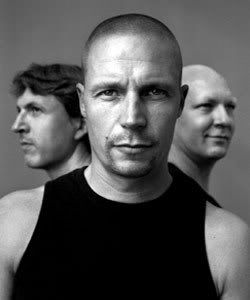 by S. Victor Aaron
by S. Victor Aaron
It feels strange to evaluate a talented musician’s latest output knowing that he will have no more new recordings forthcoming. That was the situation last year when I took a gander at Michael Brecker’s last CD, Pilgrimage. Sadly, we’re here again, as Esbjörn Svensson died this past June 14 in a diving accident near his native Stockholm at the age of 44.
Pianist Esbjörn Svensson, along with double-bassist Dan Berglund and drummer Magnus Öström, made up the Esbjörn Svensson Trio (or e.s.t.). e.s.t. had taken Europe by storm since the mid-nineties with their unconventional blend of straight but tuneful jazz, classical, rock, electronica and occasionally, other left field influences. Think Keith Jarrett delving into post-rock. Eventually, their popularity spilled over to the other side of the Atlantic just in the last few years. They even impressed the New York critics to become the first European group to be featured on the cover of Downbeat magazine.
While it has long been routine to supplement their basic acoustic recordings with post-production electronics and other contemporary effects, the added knob twiddling merely served to modernize the sonic background. The more experimental tracks would be stashed away as a “hidden track” at the end of such releases like Somewhere Else Before or Strange Place For Snow. Their last release Tuesday Wonderland moved more explicitly toward the frontier, as several of the regular songs hinted at a harder, nastier sound. At the same time, e.s.t, actively worked to expand their minds for new ideas by renting studio space between gigs for entirely improvised jam sessions.
One of those in-tour jam sessions, recorded in January 2007 over two days in an Australian studio, formed the kernel for what has become Leucocyte. The studio accoutrements, a now more significant part of the process, were completed not long before Svensson’s ill-fated scuba dive. It was released as scheduled under the Emarcy label on September 30.
The resulting recording is one that might jolt some longtime e.s.t. listeners: the songs flow and evolve over simple vamps instead of following predetermined structures, and the electronic effects are discordant and sometimes outright jarring. It more firmly falls within the realm of “electro-acoustic” than their previous work ever did, as traditional jazz forms are not abandoned, just made to compete harder against modern experimentation. This is clearly music intended to entice listeners into a comfort zone only to blast them right out of it.
That’s no more evident in the longest piece, the one-chord “Premonition I: Earth,” where Svensson’s fragmented notes trickle forth with electronically-assisted echo for the first half until the intensity has reached the point where until Öström’s rapid-fire licks bring down the song in a pogrom of dissonant noises, then eerie near-silence. “Premonition II: Contorted,” serves as a peaceful respite from “Earth,” which means a temporary return to the traditional e.s.t. format.
“Jazz” is really that, a straight-ahead hard bop piece, once the sound effects that begin this track fade away. Svensson’s funky but crisp lines amply supported by Berglund and Öström conjure up Jarrett, Peacock and DeJohnette even more than they usually do. In constrast, “Still” plods along with a slow, programmed beat, a wash of lithe synths, random noises and Svensson’s isolated piano being the lone organically-produced sound.
The album concludes with the four part “Leucocyte” suite, a roller coaster ride alternating between studio-induced cacophony and the ethereal that puts it deep into David Torn territory. It’s the part of the CD that is most likely to leave behind many of e.s.t.’s followers.
The first section, “Ab Inito,” is adorned with heavy-metal feedback, Öström’s mid-tempo thump and Svensson’s urgent, repeated notes. “Ad Interim” continues the pattern on recent e.s.t. albums to insert a minute or two of silence between a couple of pieces, only this time, this interlude of nothingness has a name (can someone really copyright that?). The thirteen minute “Ad Mortem” is primarily heavily distorted electronic effects accentuated by subdued piano voicings, the reverse of how e.s.t. had blended the two opposing technologies before this record. The sonic whitewash slowly disintegrates into eerie minimalist ambience of the final section, “Ad Infinitum.”
As a coda, Leucocyte is perhaps more comparable to John Coltrane’s Interstellar Space than Brecker’s last album. Even though both records fall somewhat short of being the respective artists’ best work, each of these albums finds that artist near the end of his life becoming restless again and moving toward a new phase of his musical development. As in the case of Coltrane, we’re left to wonder where Esbjörn Svensson’s new direction was going to take us.
- Nels Cline – ‘Consentrik Quartet’ (2025) - March 31, 2025
- Seth Walker, “Why The Worry,” from ‘Why The Worry,’ (2025): Sneak peek - March 28, 2025
- Sylvie Courvoisier + Mary Halvorson – ‘Bone Bells’ (2025) - March 27, 2025




